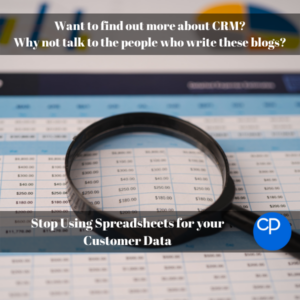 We’ve been saying this for a while now, here’s an article from our Managing Director on how to escape spreadsheet hell, but we’re still seeing businesses using spreadsheets to record and manage their customer interactions. There is a much better way to be doing this and it’s called CRM.
We’ve been saying this for a while now, here’s an article from our Managing Director on how to escape spreadsheet hell, but we’re still seeing businesses using spreadsheets to record and manage their customer interactions. There is a much better way to be doing this and it’s called CRM.
Is CRM really the answer?
Even the most basic CRMs have great reporting and contact management features. You don’t need to spend hours inputting data every month to build reports and you don’t need to keep trying to find the right spreadsheets to record your client interactions. CRM can do all this faster and more efficiently.
Is it the answer for every department though?
That is a very good question, at Collier Pickard, we have a marketing department (me), the sales department, technical consultants, directors, and the accounts department. Everyone across our business uses the CRM for most of what we do.
As a marketer, I must be data-driven in every aspect of my job. At the end of any campaign that we run I will look at the data and see how it has performed, I’ll then report back to my director, and we can decide if the campaign worked or not. I have all this data recorded in our CRM, I’ll bring up my dashboards and there we go, I can see that my last email campaign led to three new orders.
For our sales team, they will be checking their dashboards to see their monthly and yearly pipelines, time to close deals, amount of time on the phones, time spent at events and more. All this data is recorded in our CRM and then used to help the sales team focus their time on efforts that help generate business.
Our technical consultants will be tracking development work, support work, any customer cases, which clients need the most help and so on. All this data means that any one of our technical consultants can help our clients even if they haven’t worked with them before.
The accounts department will have all the information that they require in their dashboards as well. They will know who needs to be invoiced and when, who is late for payment, who needs to be paid and so on.
Finally, our directors need a bird’s eye view of the company, and they can get it. All the reports that I mentioned above are easily accessible by the directors and have been put into one dashboard just for them. This means that they can see how well my marketing campaigns are doing, how sales are doing and so on.
All of this is thanks to each department making use of the CRM and keeping everything updated. If we had this all set up in spreadsheets, we need to hire someone full time just to manage it all.
So, how do I move from spreadsheets to CRM?
Another great question! This is our bread and butter, moving to a CRM system is an upgrade, so importing all that data can be done relatively painlessly. We’ll talk to you about which data you want to be imported, how you want that data presented and how best to access it from now on.
So, to recap:
- Spreadsheets can be messy and take too much time
- CRM can streamline the whole process
- Moving your data into CRM is a piece of cake for us
If you want to find out more about how CRM can help your business, we have a wealth of content on our blog and our team has a wealth of knowledge as well. Feel free to get in touch and we will help you in any way that we can.




